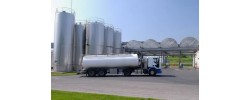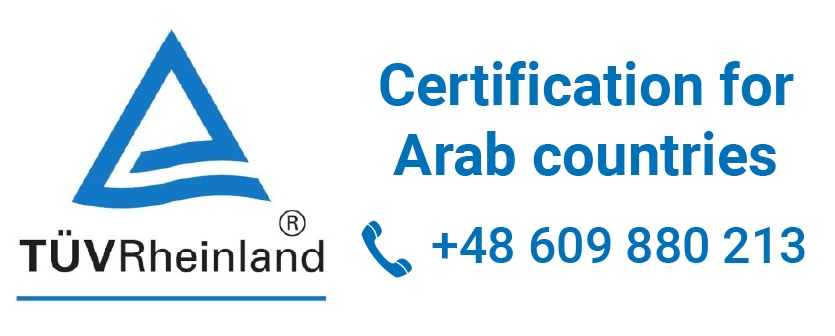Milk Transport. International Milk Transport
Milk transport in Poland and worldwide is a highly complex process, with data highlighting the vast scale of production and distribution that occurs across various supply chain levels. In 2021, Poland ranked fourth in milk production within the European Union, with a total output of 14.3 billion liters, representing a 2.5% increase over the previous year. Of this production, as much as 25% goes to export, making Poland a significant player in the international dairy market. The primary export products are cheese (accounting for about 50% of the value of dairy exports), powdered milk, butter, and cream. The value of exports in 2021 was approximately 2.4 billion euros, a 10% increase compared to 2020. The main recipients of Polish dairy products are EU countries, especially Germany, which accounts for nearly 30% of total milk and dairy exports from Poland, along with the Czech Republic, Italy, and the Netherlands.
Globally, data from the Food and Agriculture Organization of the United Nations (FAO) indicate that worldwide milk production reached about 900 billion liters in 2021. The largest milk producer in the world is India, with an annual production of approximately 210 billion liters, representing nearly 23% of global production. India is also the largest consumer of milk, where it is an essential dietary component. The second-largest producer is the European Union, which produces about 155 billion liters of milk annually, of which 10-15% is exported. The United States follows, with a production level of 100 billion liters, and then Pakistan, with 50 billion liters. Global milk production grows by around 1.5-2% per year, driven primarily by increased demand in developing countries.
In Poland, milk is primarily transported via refrigerated tankers, with several thousand vehicles serving the dairy market. Each day, tankers travel an average of around 200-300 kilometers to collect milk from farms and deliver it to processing facilities. There are about 200 large and medium-sized dairy plants in Poland that process raw milk into various dairy products. In total, Polish dairy farms produce around 40 million liters of milk daily, which must be transported in optimal conditions to maintain its freshness and quality.
Refrigerated tankers transporting milk must meet stringent hygiene standards and be equipped with temperature monitoring systems. Raw milk is transported at temperatures ranging from 2 to 6 degrees Celsius, and the time from collection to delivery to the processing plant must not exceed 24 hours to prevent bacterial growth. In Poland, approximately 90% of the milk produced on farms, or about 12-13 billion liters annually, is transported daily. Milk transport is a significant part of production costs—in fact, according to the Institute of Agricultural and Food Economics (IERiGŻ), transport costs make up about 15% of the total milk production costs.
Milk transport is one of the critical elements in the supply chain of the agricultural and food industry. It is a logistical process requiring proper organization and infrastructure to deliver a fresh product to processors and end consumers. Poland, as one of the largest milk producers in the European Union, plays a vital role in this sector, with milk transport taking place on a large scale daily, ensuring the continuity of supply for the dairy industry and consumers domestically and abroad. In 2021, Poland produced approximately 14.3 billion liters of milk, placing the country fourth in the EU in production, just behind Germany, France, and the Netherlands. This significant output requires efficient transport from dairy farms to processing plants, where milk is transformed into various products such as cheese, yogurt, butter, cream, and pasteurized milk.
Milk transport primarily relies on specialized vehicles—refrigerated tankers—that enable the transportation of raw milk under cooling conditions, maintaining a temperature between 2 and 6 degrees Celsius, which is essential for preserving the quality and safety of the raw material. Transport typically occurs directly from farms to dairy plants, minimizing transport time and preventing product degradation. Poland has about 70,000 dairy-producing farms, meaning thousands of tankers traverse Polish roads daily to deliver milk to approximately 200 dairies spread across the country. The transport system must be flexible to meet changing demand and adapt to diverse road infrastructures, especially in rural areas.
On a global scale, milk transport is also challenging. According to data from the Food and Agriculture Organization (FAO), global milk production in 2021 amounted to around 900 billion liters, with the largest quantities produced in India, the European Union, the United States, and Pakistan. The European Union, which is the second-largest milk producer globally, produced around 155 billion liters, with a significant portion of this production exported to non-EU countries, especially Asian and African markets. EU dairy exports are valued at around 19 billion euros annually, encompassing mainly cheese, butter, powdered milk, and condensed milk. In international transport, milk is most often transported in processed forms, which increases product shelf life and minimizes the risk of quality loss.
In Poland, road transport dominates milk transport. Due to the need to quickly deliver raw material from farms to processing facilities, milk tankers must be equipped with advanced cooling and monitoring systems that allow for temperature tracking during transport. Poland has a developed network of transportation companies specializing in the transport of food raw materials, including milk. Due to the specific technical requirements of the tankers and operating costs, carriers incur relatively high costs, which constitute about 10-15% of the total milk processing costs. These requirements stem from EU regulations, which impose strict standards on food hygiene and safety, including detailed rules for washing and disinfecting tankers and maintaining appropriate transport temperatures.
Statistics show that Poland has one of the more developed road infrastructures in Central and Eastern Europe; however, challenges remain regarding access to farms in areas with limited paved road access. In regions such as Podlasie, where a large portion of milk production is concentrated, rural roads are often in poor condition, which can affect transport time and costs. For larger dairy farms that supply milk to large processing plants, transport generally takes place daily, while for smaller farms, collection occurs every two or three days. The main challenge here is to minimize milk loss and ensure high quality, which is particularly challenging in the summer when temperatures are higher and cooling requirements are more stringent.
However, the milk transport process does not end with the delivery of raw milk to the processing plant. Subsequently, processed dairy products—such as yogurts, cream, butter, pasteurized milk, and others—must also be transported to retail points. These products are transported in refrigerated trucks that maintain temperatures from 0 to 4 degrees Celsius. In Poland, an extensive distribution network enables daily deliveries of dairy products to stores, supermarkets, and wholesalers, ensuring consumers have access to fresh products. In 2021, dairy exports from Poland amounted to approximately 2.4 billion euros, representing a 10% increase from the previous year. The main export markets are Germany, the Czech Republic, Italy, as well as non-European markets, such as China and Middle Eastern countries.
- Road transport
- Transport Technology
- Logistics, Forwarding, Warehouses, Customs clearance
- Sea, rail and air transport
- TSL - Information worth attention
- Oversized loads
- Transport Europe - key transport directions
- Transport Scandinavia. Transport to Scandinavia
- Transport Balkans
- Transport Asia, transport to Asia
Road transport
Milk Transport. International Milk Transport


Source: https://www.poland-transport.eu

See also:

Transport from to Serbia. Transport Poland Serbia
Freight transport to and from Serbia plays a key role in European trade, connecting Poland with the Balkans and Southeastern Europe. Serbia, situated on key transport routes, plays an important role as a transit hub.

Transport to Hungary. Transport between Poland and Hungary
Transport to Hungary is an important segment of the international transport market, connecting Poland with Central and Southern Europe. What are the biggest challenges related to the organization of freight transport between Poland and Hungary?

Transport to Latvia. Transport to and from Latvia
The most popular form of transport is road transport to Latvia, which guarantees great freedom of action and a relatively quick delivery time. Thanks to the close distance between Poland and Latvia, deliveries can be made even within one day

Transport Switzerland. Transport Switzerland to and from Switzerland
Transport companies handling transport from and to Switzerland guarantee fast and safe delivery of goods, using an extensive network of roads and motorways in both directions. It is Polish carriers that effectively carry out freight transport to Switzerland

Transport Austria. Transport to and from Austria
Transport to and from Austria is an important, and sometimes even key, segment of international logistics, aimed at ensuring efficient exchange of goods between Poland and one of the key countries of Central Europe, i.e. Austria.

Transport to and from Spain. Transport Spain
Polish transport companies transport meat, dairy products, cereals, and fruit and vegetable products to Spain
Help needed ?
If you have not found the desired freight, an available truck or a suitable transport and forwarding company, or the search results are not satisfactory for you, do not hesitate to write to us to tell what you are looking for. We will send your inquiry directly to transport companies.
Write to us

 pl
pl  en
en  de
de  es
es  fr
fr  it
it  pt
pt  ru
ru  sv
sv 







